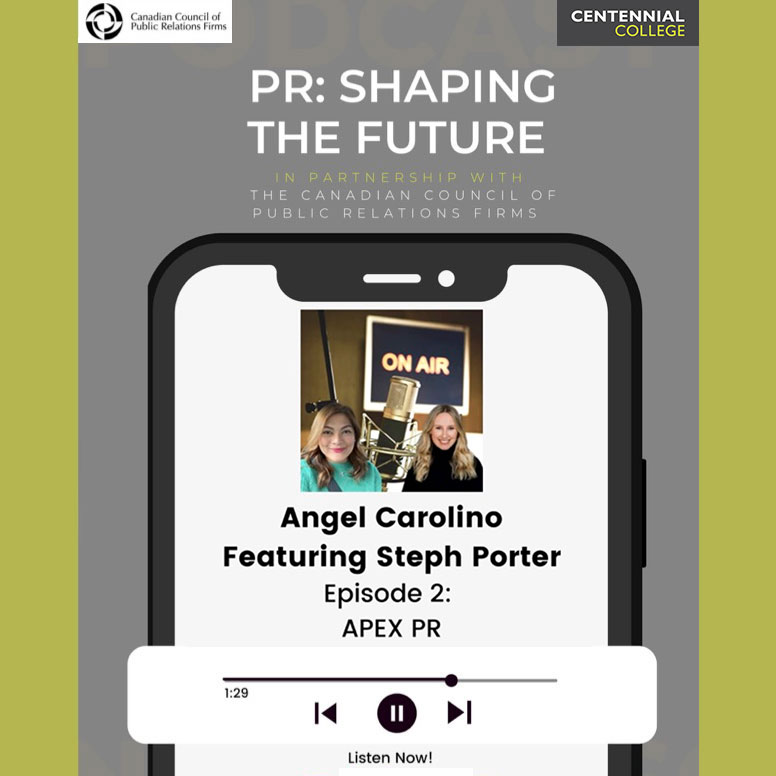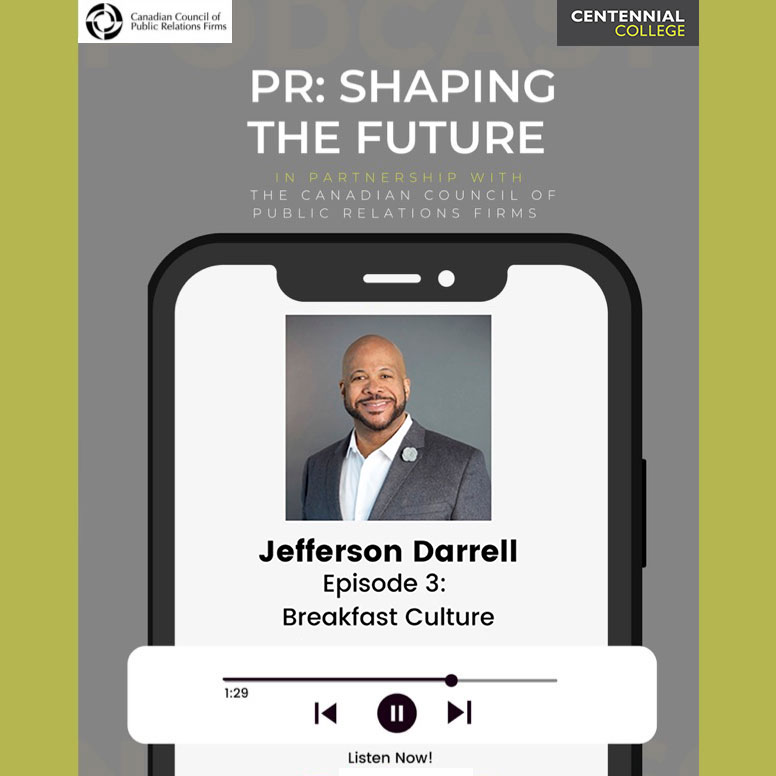Episode Transcript
Speaker 0 00:00:00 Welcome to Centennial college podcast series PR shaping the future. Join our team of post-grad students from this ten-year college public relations corporate communications program who have partnered with the Canadian council of public relations firms to explore diversity and inclusiveness in the PR industry. This will be the first episode of a three part series where we interviewed diverse BiPAP individuals who have been making impacts in the world of public relations and communications. My name is Kara and today I'm here with special guests, Joseph communications and outreach manager of in spear foundations. We will be exploring the worst of in spear foundations. Joseph's personal journey in the industry, current barriers and challenges regarding DNI and what the future of PR regarding inclusiveness looks like. Let's begin by taking a look at, into spirit foundations.
Speaker 1 00:00:51 So in spirit foundation is, um, again, a foundation. So we work in the business of philanthropy. So our focus is on funding, um, young youth BiPAP, uh, specifically content creators to help get their messages out, to help tell their stories, um, with these people who aren't necessarily given the platform to tell these stories. And our two major areas of focus is, uh, the first one is addressing, is Lama phobia. And the second one is fostering reconciliation. So it was really, really interesting for me, um, as someone who identifies as BiPAP, um, to be part of an organization that's willing to, um, support and, and amplify our voices and kind of give us platforms and, and funding, which is, you know, again, racialized communities often don't receive
Speaker 0 00:01:45 Your organization's work. Sounds incredible in terms of DN dye hasn't spear participated in any recent or exceptionally successful initiatives as a result of this
Speaker 1 00:01:54 Working in philanthropy, a lot of the different communications campaigns we have are usually the announcement of supports or the announcement of funding for different organizations. One, you know, quite recent campaign that we did was our announcement of, um, funding, the indigenous people's resilience fund. Um, so the reason I bring up this campaign and the reason I think it was successful is because we, um, from a communications end really collaborated with the indigenous peoples resilience fund to understand how they best want to provide this message. And again, when you're dealing with, you know, uh, racialized communities, there are some intra intricacies in the language use, and you want to make sure that, you know, you're honoring and you're respecting all of, uh, specific parties. So with that campaign, you know, we set aside timeline, but we based that timeline, uh, on their priorities. And however, they felt most comfortable in announcing this for the actual announcement itself, we went with, you know, news wires, press releases because we are speaking to an audience that, that we would like to educate, understand that we were supporting, you know, the indigenous peoples and hopefully they could come in as well.
Speaker 1 00:03:10 The creation of the language was really a collaborative effort between us and all those involved.
Speaker 0 00:03:17 It's amazing that in spirit was able to support the indigenous community in such an honorable way, especially considering the intricacies of the language and the culture. How has this campaign aided in starting social change?
Speaker 1 00:03:29 The social change that it brought to the penis was really, uh, as a, uh, philanthropic organization showing our support for indigenous issues and really taking a stance and putting honestly our money where our mouth is, um, you know, with reconciliation being really, really big pond, all the news of all the unmarked graves that were uncovered, you know, really having our organization publicly putting money forward. And also that kind of causes a ripple effect in the philanthropic community for, for them to, you know, also, uh, take some action. So I think the social change would be, um, collaborating directly with indigenous communities, but from a bigger standpoint, suggesting actions should be taken from different organizations as well.
Speaker 0 00:04:09 That's a great point. You made, especially about generating a ripple effect to educate and encourage other organizations or even the community around to take action. Let's take a step back and look at your own personal journey in the field. Do you mind explaining a bit about your educational background leading up to communications
Speaker 1 00:04:25 In terms of education? I studied at the university of Toronto where I did actually a bachelor's of kinesiology, which I know isn't really related to comms, but I eventually did certificates in multimedia journalism as well as multimedia storytelling and content marketing. So, as I mentioned, I kind of had a different, um, career route. I studied initially in the sciences. Um, coming from a Filipino background is very traditional to go into the sciences to go into healthcare. But by the time I was in fourth year, I realized that my passion and my personality and skillset lend itself to more of a communications role. Um, I really liked writing. I always loved it. It was funny. And in high school, you know, that was actually my highest grade in elementary school. I participate in speech contests and I always loved public speaking. So there are always signs throughout, you know, my youth or my childhood. And even my education were pointing me towards something that had to do with, with communications. But it was really only until I was in a science degree where like, oh, you know what, you know, maybe communications is the best for me
Speaker 0 00:05:32 Lo it wasn't a straight path for you honing and true skillsets seem to really lead you to this career as a BiPAP individual. What are some barriers to entering this field
Speaker 1 00:05:41 Coming again from a racialized and immigrant background? A lot of the things that were pushed onto us in school for example, were really about the sciences or about the maths. There wasn't really targeted campaigns or, or ways to present other aspects or other fields of work to, to me, as I say, as a high school screen or currently to racialize students, right? They currently operate within the spheres of culture that they know and PR communications marketing typically isn't that for those from racialized communities. So I really think one of the bigger barriers to entry is that lack of understanding and lack of awareness of what PR is and what are the different skill sets you need. You know, there are so many racialized storytellers who perhaps haven't had a chance to tell their stories because they didn't know that this was an option.
Speaker 0 00:06:32 Very true. And it's understandable how BiPAP students, especially those with cultural cloud over them, tend to either be unaware of, or steer away from PR because of this generational familiarity with other career paths, with this being said, is there any advice you have for students who may be considering a career in communications?
Speaker 1 00:06:50 So for many, you know, young racialized immigrants or people of color storytelling is really in our blood, right? From gossip, gossiping between aunties to cultural dance and music to coming up with, you know, long-winded stories of excuses. We tell our parents when they ask us where we are, storytelling is really in our blood and that's a skill that I really encourage youth to develop and, um, take with them on any career path. Oftentimes we don't understand that this is a feasible career path, right? Usually we're told to go into the sciences. We're told to go into the maths, but as born storytellers, there is something there for us, for us to use words and images and visuals to, uh, weave a narrative and tell a story, right? So public like public relations, communications and marketing is a feasible career. Um, for young racialized people, um, to carve something out for themselves in a way that they add to the, to the tapestry, that is our own cultural stories. It's really a career. I think we can thrive in
Speaker 0 00:08:05 Earlier on in our conversation. One of the proceeds you mentioned for Dean Knight and PR was to develop practices such as messaging and content that are respectful and reflective of the audiences they speak to and the organizations they represent. Are there any internal procedures you want to stress?
Speaker 1 00:08:22 One thing that I've been thinking about a lot is the notion of power and you know, where that resides and how, how does that influence, uh, what's the trickle down effect. So I think in terms of DEI, and if you want there to be real change through power is having diversity at, in those spots of influence and power. There's, you know, often ongoing memes and stuff on LinkedIn, where an organization says they're diverse, but then when you look at the triangle of diversity, sure, there are some brown faces at the bottom, but at the top, it's usually typically all white, right? So I think to disrupt that and have true DEI in organizations is have that representation reflective within all scopes of the power, um, pyramid or the power network, right? Uh, it's hard to tell diversity when the top of the organization isn't reflective of that.
Speaker 0 00:09:17 Understood. So overall it builds trust to show that PR and communications is not only an industry that says that they represent and encourage the in NY, but that is internal practice as well. We have come to the end of our segment and I want to thank the communications and outreach manager of inspire foundations, Joseph for joining us today. Be sure to follow in spear foundations on Instagram, Twitter, and Facebook for updates on the work that they do to achieve a more pluralistic and inclusive Canada. Join us next week. As we hear another story from another PR practitioner who has also been making impacts in the world of PR and communications and how we can continue to shape the future of PR, make sure it's subscribed to Centennial college podcasts, SoundCloud, Spotify, apple podcasts, and Google podcast. This is Tara, and this is PR shaping the future presented by Centeno coaches, public relations, corporate communications program, partnered with the Canadian council of public relations firms. Thank you for joining us.

